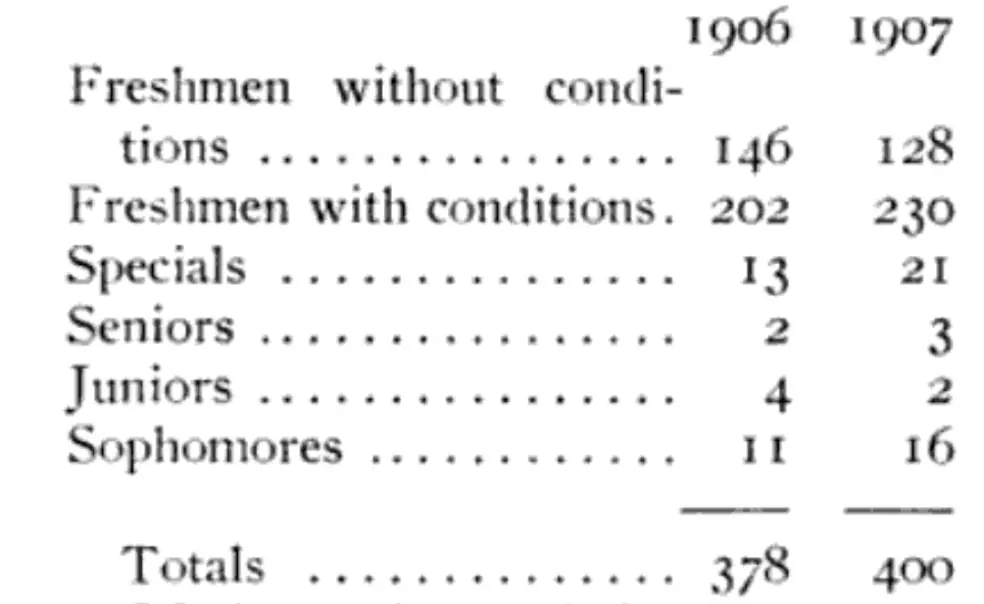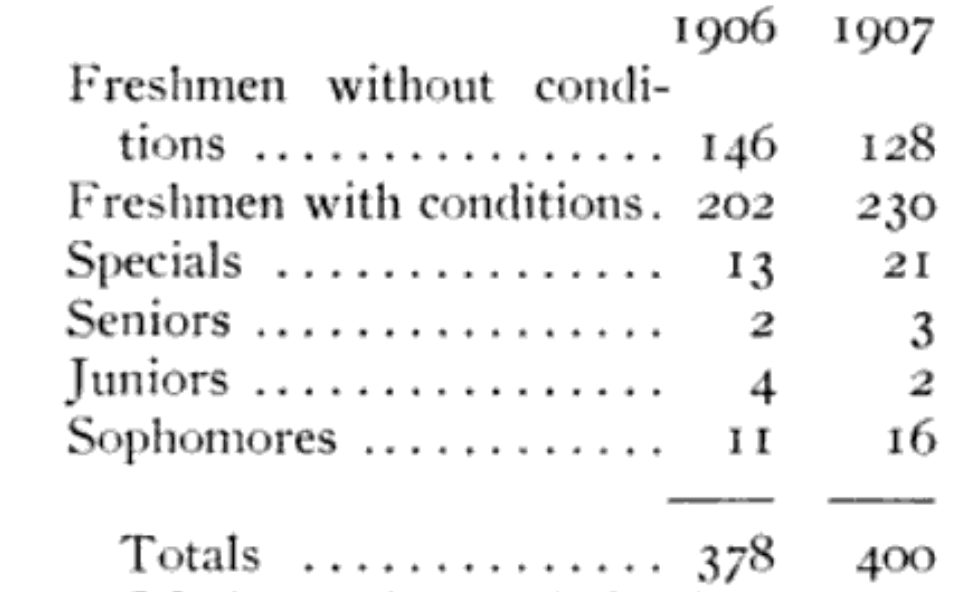President Woodrow Wilson's ’79 Annual Report (1908)
“The comfort and convenience of class-room work and of preceptorial conferences have been immeasurably increased by the completion of McCosh Hall, a building which has in use confirmed in every way our anticipation of what it would be.” - President Woodrow Wilson ’79
In his Annual Report to the Board of Trustees, which was submitted at their January meeting, President Wilson ’79 reviewed the additions to the faculty during the year, and discussed the adjustment of the preceptorial system to the new curriculum, the completion of McCosh Hall and the presentation of the Sun-Dial, the beginning of the new Physical Laboratory, and the University enrollment, as follows:
Gentlemen of the Board of Trustees:
I have the honor to submit my annual report for the year 1906-1907.
Since my last report we have had the pleasure of receiving the following additions to the teaching staff of the University:
Professor Edward Capps, Professor of Classics, who graduated with the degree of Bachelor of Arts from Illinois College in 1887 and who was Instructor in Greek and Latin in his alma mater, 1887-1888; who pursued graduate studies in Greek, Latin and Sanskrit at Yale University from 1888 to 1891, and who received from that institution in 1891 the degree of Doctor of Philosophy. Mr. Capps was Instructor in Latin in Yale, 1890-1891; Tutor in Latin in the same institution, 1891-1892; Assistant Professor of Greek at the University of Chicago, 1892-1896; studied in the American School for Classical Studies at Athens, and at the Universities of Berlin, Munich, and Halle from 1893 to 1895; became Associate Professor of Greek at the University of Chicago in 1896, and Professor of Greek in the same institution in 1900, the chair which he occupied until coming to us. He was Lecturer on Greek Comedy and the Greek Theatre at Harvard University during the first half year, 1904-1905, and was Managing Editor of Classical Phiology from 1906- to 1907. He is at present President of the Classical Association of the Middle West and South. Professor Capps’ reputation as a classical scholar has placed him in the front rank of the students of the classical languages, and it is with especial pleasure that we welcome him to Princeton, where the faith in the disciplinary and illuminating power of those languages still continues vivid and effectual.
[The President then gave the academic records of the new preceptors and instructors, referred to the promotions and other changes in the faculty, and continued:]
Nothing specially calling for report has marked the progress of the year. It was a season passed in a quiet adjustment of the work f the classroom and preceptorial conference to the new plans and methods of study which have been instituted during the last five years of the administration of the University. I think that I can say that we have become still more deeply convinced by reason of the quiet and substantial success of our new plans that we have passed the period of experiment and are entering a period of satisfactory fruition. I think that my colleagues of the faculty would agree with me in saying that the work of the year was more solidly done and was lifted to a higher level than the work of any previous year that we remember. We feel that we have reason to congratulate ourselves upon the way in which the new course of study and the new methods of instruction have stood the test of use and experience. No modifications of any consequence have been necessary since the outset, and we hope that further experience will only confirm our success.
The comfort and convenience of class-room work and of preceptorial conferences have been immeasurably increased by the completion of McCosh Hall, a building which has in use confirmed in every way our anticipation of what it would be. It has increased our class-room space sufficiently to relieve entirely the old congestion, and it has added to the old rooms rooms of delightful proportion and unusual beauty and dignity. The building is a remarkable monument alike to the generosity and to the good taste of the the donors, and the architect is deserving of very warm praise for the care and success with which he has worked out its spacious and convenient arrangements.
On the thirty-first of October last we had the pleasure of unveiling a beautiful sun-dial presented to the University by the generosity of Sir William Mather. The dial is an exact reproduction of the historic sun-dial constructed in 1551 by Charles Turnbull, that stands in the quadrangle of Corpus Christi College at Oxford. It is monumental in character, standing upon a broad base and lifting its shaft with the emblematic pelican borne upon its top to a height of more than twenty feet. It is placed just north of McCosh Hall in the newly graded portion of the ground which will constitute the court of the quadrangle of buildings which we have planned sooner or later to draw about the space behind Marquand Chapel. The unveiling of the sun-dial was rendered a very notable ceremony by the presence of the Right Honorable James Bryce, the British Ambassador to the United States, who, as a friend of Sir William Mather’s, as a representative by long and distinguished connection of Oxford University, and as the spokesman of good will between the two nations, presented this singular and significant gift to the University in the name of the donor in a way which all who were present will long remember. It is pleasant to add that this interesting gift was made by Sir William Mather with the very cordial consent and good wishes of the authorities of Corpus Christi College.
Work has begun and is being rapidly pushed forward on the foundations of the new Physical Laboratory which it is hoped will be completed by the beginning of the academic year 1908-1909. This laboratory has been planned upon the most liberal scale and will be one of the most notable additions ever made to the teaching facilities of the University in the field of science.
The total number of graduate students, which was last year 112, is this year 113. Of this number, 46 are devoting themselves exclusively to graduate study as against 38 last year, and 67 are combining graduate study in the University with work in Princeton Theological Seminary. Of the 46 regular graduate students, ten are in residence at Merwick and sixteen take their meals there.
The following table shows the number admitted to the University as undergraduates this year as compared with last:
Of the students admitted upon examination in 1906, twenty-six for one reason or another did not come. Of those admitted this year, thirty did not come. So that the corrected figures for the two years are: 1906, 352; 1907, 370. The number of freshmen who entered the University in 1906 was 322, in 1907, 328, a gain of six in entrance figures of this year as compared with those of last year. To these statistics the following should, for the full information of the Board, be added:
There was thus a gain of thirty in the number of preliminary and partial examinations this year as compared with a gain of eighteen last year and a loss of forty-eight the year preceding.
The total undergraduate enrollment of the University is 1188 and was last year 1235, a decrease of forty-seven. The figures of last year showed a decrease of forty-four as compared with the preceding year.
Respectfully submitted,
Woodrow Wilson
This report was originally published in the January 22, 1908 issue of PAW.














No responses yet